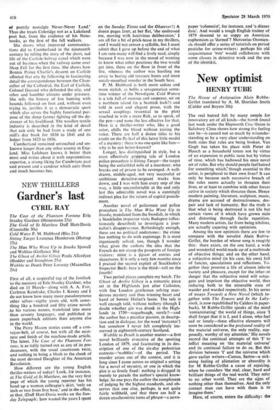NEW THRILLERS
Gardner's last
CYRIL RAY
The Case of the Phantom Fortune Erie Stanley Gardner (Heinemann 25s) The Gold of St Matthew Duff Hart-Davis (Constable 30s) Cold Water P. M. Hubbard (Bles 21s) Sitting Target Laurence Henderson (Harrap 25s) The Man Who Went Up in Smoke Sjowall and Wahloo (Gollancz 30s) The.Ghost of Archie Gilroy Paula Allardyce (Hodder and Stoughton 25s) Wobble to Death Peter Lovesey (Macmillan 21s)
First of all, a respectful tug of the forelock to the memory of Erie Stanley Gardner, who died on 11 March—along with A. A. Fair, Carleton Kendrake, Charles J. Kenny and I do not know how many more pseudonymous other selves—eigthy years old, with some- thing like a hundred and fifty crime novels .to his various names, translated into more than seventy languages, and published in more paperback editions than anyone else in the world.
The Perry Mason stories came off a con- veyor-belt, of course, but with all the neat- ness and finish of the machine-made article. The latest, The Case of the Phantom For- tune, is as tidily turned-out as any of its pre• decessors, with the usual courtroom twist, and nothing to bring a blush to the cheek of the most devoted Daughter of the American Revolution.
How different are the young English thriller-writers of today! Look, for instance, at The Gold of St Matthew, on the very first page of which the young reporter has his hand up a woman colleague's skirt, 'only an inch or two from first base,' and in the office, at that. (Duff Hart-Davis works on the Sun- day Telegraph: how wasted the years I spent on the Sunday Times and the Observer!) A dozen pages later, at her flat, 'she undressed
me, moving with lascivious deliberation.' I am all for a bit of prick-tease in my thrillers, and I would not censor a syllable, but I must
admit that I gave up before the end of what I am sure many will find a lively read, simply because I was now in the mood of wanting
to know what other positions the two would get into, there on the floor in front of the fire, whereas the author was hustling me away to boring old treasure hunts and mere mealy-mouthed murder in the South Seas.
P. M. Hubbard is both more sedate and more stylish, as befits a sexagenarian some- time winner of the Newdigate. Cold Waters is a tale full of menace and suspense, set on a northern island (in a Scottish loch?) and told in cool and elegant prose, with the sexual couplings (essential to the plot) touched in with a mere flick, so to speak, of the pen—and none the less effective for that. Here is a thriller-writer who, like a good actor, chills the blood without raising the voice. There are half a dozen titles to his credit on the fly-leaf of this latest little model of a mystery: there is no one quite like him— why is he not better-known?
Longer, less distinguished in style, but a most effectively gripping tale of London police procedure is Sitting Target—the target being the unfaithful wife of a murderer, who breaks out of prison to be revenged. A well- drawn, middle-aged, not very successful or ambitious detective-sergeant tracks him down, and I was with him every step of the way, a little uncomfortable at the end only lest this admirable novel was a cunningly indirect plea for the return of capital punish- ment Another novel of policemen and police procedure is The Man Who Went Up in Smoke, translated from the Swedish, in which a Stockholm inspector visits Budapest (affec- tionately described) to investigate a jour- nalist's disappearance. Refreshingly enough, there are no political undertones: the crime has nothing to do with espionage. It is most ingeniously solved, too, though I wonder what gives the authors the idea that the French do not stamp the passports of foreign visitors: mine is a jigsaw of entries and departures. It is only a very few months since I praised the second exploit of Stockholm's Inspector Beck: here is the third—roll on the fourth!
Two period pieces complete my batch. The Ghost of Archie Gilroy is a romantic piece set in the Highlands just after Culloden, with fine London gentleman solving mur- derous mystery and thus winning heart and hand of bonnie Hielan's lassie. The tale is well enough told, without tushery (though I doubt whether gin was drunk in the High- lands in 1750—usquebaugh, surely?—and the author has a peculiar passion, in descrip- tion and in dialogue, for the word 'instanter') but somehow I never felt completely im- mersed in eighteenth-century Scotland.
Wobble to Death is another matter—a first novel brilliantly evocative of the sporting London of 1879, and fascinating in its des- cription of one of the six-day pedestrian contests—'wobbles'—of the period. The murder arises out of the contest, and it is long since I came across so original a setting for a novel of mystery, or one in which the plot is so firmly fixed: nothing is dragged in merely to parade the author's special know- ledge. So one pays the author the compliment of judging by the highest standards, and ob- serves that one clue, perhaps, is not quite fairly withheld, and that there are half a dozen anachronistic turns of phrase—a news- paper 'columnist', for instance, and 'a dinner date'. And would a tough English trainer of 1879 descend to so soppy an American euphemism as 'darned'? Mercurius Oxonien- sis should offer a series of tutorials on period pastiche for crime-writers: perhaps his old acquaintance 'PUS' would collaborate with some classes in detective work and the use of the identikit.


































 Previous page
Previous page